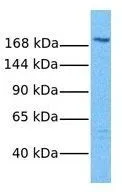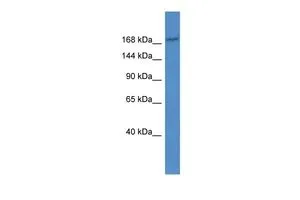
WB analysis of mouse thymus tissue using GTX44679 MRP2 antibody at 1.0μg/ml.
MRP2 antibody, Internal
GTX44679
ApplicationsWestern Blot
Product group Antibodies
ReactivityMouse
TargetAbcc2
Overview
- SupplierGeneTex
- Product NameMRP2 antibody, Internal
- Delivery Days Customer9
- Application Supplier NoteWB: 0.2-2.5 ug/ml. *Optimal dilutions/concentrations should be determined by the researcher.Not tested in other applications.
- ApplicationsWestern Blot
- CertificationResearch Use Only
- ClonalityPolyclonal
- Concentration0.5-1 mg/ml
- ConjugateUnconjugated
- Gene ID12780
- Target nameAbcc2
- Target descriptionATP-binding cassette, sub-family C member 2
- Target synonymsAbc30, Cmoat, Mrp2, cMRP, ATP-binding cassette sub-family C member 2, ATP-binding cassette, sub-family C (CFTR/MRP), member 2, ATP-binding cassette, sub-family member 2, canalicular multispecific organic anion transporter 1, multidrug resistance protein 2, multidrug resistance-associated protein 2
- HostRabbit
- IsotypeIgG
- Protein IDQ8VI47
- Protein NameATP-binding cassette sub-family C member 2
- Scientific DescriptionThe membrane-associated protein encoded by this gene is a member of the superfamily of ATP-binding cassette (ABC) transporters. ABC proteins transport various molecules across extra- and intra-cellular membranes. ABC genes are divided into seven distinct subfamilies (ABC1, MDR/TAP, MRP, ALD, OABP, GCN20, White). This protein is a member of the MRP subfamily which is involved in multi-drug resistance. This protein functions in the canalicular surface of the hepatocyte and in biliary transport, and appears to contribute to drug resistance in mammalian cells. Several different mutations in the human gene have been observed in patients with Dubin-Johnson syndrome (DJS), an autosomal recessive disorder characterized by conjugated hyperbilirubinemia. Alternative splice variants have been observed for this gene; however, they have not been fully described. [provided by RefSeq, Jul 2008]
- ReactivityMouse
- Storage Instruction-20°C or -80°C,2°C to 8°C
- UNSPSC12352203

